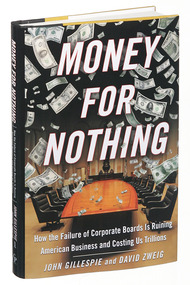One of my pet peeves has been the cronyism on Corporate America’s Boards of Directors. As I noted in Bailout Nation:
“But don’t for a moment think their terrible track record had a negative impact on their compensation. Despite their performance, these CEOs were paid as if they were enormous successes. The compensation figures that follow are enormous; that they were paid for such abject failure is a national embarrassment. It is also an indictment of three major corporate governance issues that have not been discussed widely enough.
The first is the crony capitalism that was rife in boardrooms across the United States. The cronyism of major corporate boards, especially those in the finance area, has become legendary. Rubber-stamp directors who rarely buck the chair man or challenge the CEO are unfortunately all too common. These boards did not serve either their companies or their shareholders well.”
That was all I had space for regarding criticizing Boards of Directors — barely more than a paragraph. It is a topic worthy of its own book.
 And now, that book is here: Money for Nothing: How the Failure of Corporate Boards Is Ruining American Business and Costing Us Trillions by John Gillespie and David Zweig.
And now, that book is here: Money for Nothing: How the Failure of Corporate Boards Is Ruining American Business and Costing Us Trillions by John Gillespie and David Zweig.
From the Sunday NYT Business review:
IT sounds like good work if you can get it, and thousands of people in corporate America do. On average, they attend 8 to 12 meetings annually. Although they are supposed to have fiduciary obligations, they often appear simply to warm their assigned seats, and to raise their hands when their leader calls for a vote. For that, they can receive as much as $640,000 a year . . .
“Underworked, overpaid corporate boards are doing serious harm to the shareholders of public companies and the economy. In the wake of the global economic debacle, the name of the game for authors of business books is assigning blame. Many recent books have pointed accusatory fingers at the problems of specific firms like Bear Stearns, Lehman Brothers and Fannie Mae, and of certain executives.
But “Money for Nothing” casts a much wider net, blaming the financial crisis on a systemic collapse of corporate democracy caused by the failure of many if not most corporate boards to simply do their jobs. “The boards were supposed to monitor risks, provide judgment and supervise managers on behalf of shareholders,” Mr. Gillespie and Mr. Zweig write. “Boards, at the very least, should have acted in the classic sense like a governor on an engine that measures and regulates the machine’s speed and, if necessary, turns it down to keep it from blowing up.”
They devote an entire chapter, “The Myth of Shareholders’ Rights,” to showing the heavily lopsided power of corporate managements in board elections and proxy votes. And they explain why so many companies incorporate in Delaware, where state laws exempt corporate executives — and directors — from financial liability for their actions.”
I could not agree more.
Being a Director of several small firms, I have learned quite a few things about BofDs. On the one hand, it is frustrating when you are unable to respond to certain criticisms due to the need for secrecy (for strategic or litigation reasons). But for the most part, it is a very interesting experience — working with very smart and experienced people, getting an education in all manner of legal/accounting/regulatory issues, watching how some CEOs can execute well. Oh, and it is also potentially lucrative, though I have yet to enjoy any windfalls from my board seats. (One day, I will write up those experiences, warts and all).
To fix the problem, I go even further than the authors of Money for Nothing do — I would assign a fiduciary obligation on the parts of the big institutional holders of stock (on behalf of the actual owners): The mutual funds, pension funds, CALPERS, etc. I would assign an actual obligation to vote the shares (most don’t now), and mandate they perform true analyses of all board candidates. Mom and pop do not have the time, expertise or ability to analyze and vote on every director for every stock they own. Put the burden on those who do have the staffing and ability — the mutual funds.
Lastly, the asset management needs to be separated from the business side — so mutual funds don’t whore out their clients (the investors) when pursuing 401k business and free money like syndicate/IPO.
The bottom line: A Board seat is serious business, and most of America’s directors have done a lousy job discharging their duties.
>
Source:
Taking Away Directors’ Rubber Stamps
HARRY HURT III
NYT, January 16, 2010
http://www.nytimes.com/2010/01/17/business/17shelf.html


What's been said:
Discussions found on the web: